The attempted killer who hid under the bed
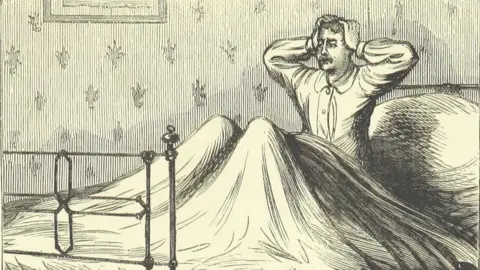 Routledge/British Library
Routledge/British LibraryIt was Thursday, 20 August 1840, at the end of a busy market day in Ludlow.
William Miller Mackreth, a trader from Bristol, retired to his room at the packed Angel Inn.
He locked the door, blew out the candle, and went to bed. The clock ticked and the hours passed until it reached 04:00.
A sudden loud smash startled the guests, and the landlord who woke to the sound of blood-curdling cries coming from an upstairs room.
When they rushed to see what was going on, they were confronted by Mr Mackreth on the stairs, in his bed clothes, with his blood-soaked hands gripping his throat.
He had a gash that stretched from ear to ear.
They took him back into the bedroom and sat him down.
Unable to speak, the victim pointed to the bed.
They tentatively looked underneath and saw the figure of a man clearly marked in the dust.
A trail of blood leading from Mackreth’s room to that of another guest led the police to the suspect, a 25-year-old penniless man from Birmingham, Josiah Mister.
He was arrested and put on trial for attempted murder to which he pleaded not guilty.
But would he receive a fair trial? From the outset he seemed up against it.
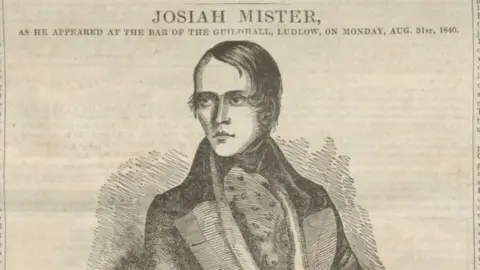 Worcestershire Chronicle
Worcestershire ChronicleA newspaper reporter from the Worcestershire Chronicle described the defendant as he stood in the dock at his first hearing.
“He has a large and full mouth, with what the artists term a well-chiselled upper lip, expressive of strong, very strong, animal passions, and steady determination; his eye is peculiar and (though rather dimmed on the morning in question) was bright, glittering, and wild as that of a newly-caged rat, the day previous, when first in custody.”
There were key pieces of evidence against Mister, including the trail of blood that led from the victim’s room down the corridor to Josiah’s door, and traces of blood on the curtains and his shirt.
In an early example of forensic testing, a surgeon who had been at the inn examined the suspect’s room.
He saw a bowl filled with water, dipped his finger in it and could taste alum, a type of soap used in shaving that could remove blood from clothing and stop shaving cuts.
The implication was clear: Josiah had tried to wash off any blood.
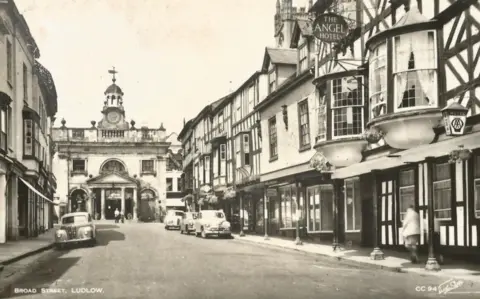 Walter Scott
Walter ScottA razor blade was discovered on the floor in the courtyard just a few yards from Josiah’s window.
And a match was found under the bed which was of the same brand he had been seen with the day before.
The defence barrister argued this was all coincidental.
The matches were commonplace, there was no proof the razor belonged to his client, and the trail of blood could have got there from other people walking up and down the corridor after the attack fetching bandages.
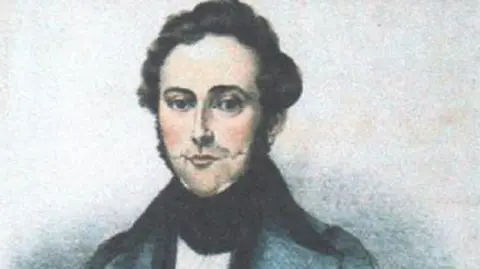 Shropshire Archives
Shropshire ArchivesThe jury deliberated for just 35 minutes before delivering their verdict of guilty and Josiah was sentenced to death.
Visibly shaken and in a subdued voice, he replied, ‘I am not guilty of it.’
A petition was drawn up and his victim, Mackreth, even backed calls to have the sentence commuted to transportation, but this was rejected.
Josiah Mister was hanged at Shrewsbury prison in front of a huge crowd and buried at St Mary’s church.
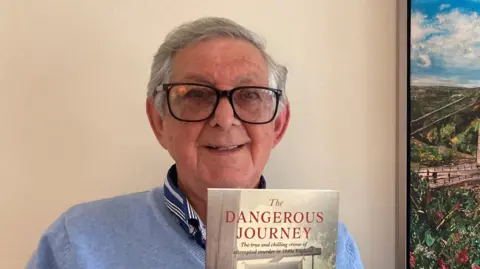
Fred Hillberg is the great-great grandson of William Miller Mackreth and has just published his own book about the attack.
He says William had just got engaged before the incident and when he returned to Bristol his fiancée still married him despite “this huge scar right down the side of his face through his mouth to the other.”
Fred is convinced they got the right man.
“I do, no doubt, and William also thought he did it.
The fact he survived [meant] he was prepared to forgive him.
William was a kind religious man anyway and he would have been quite happy for the man not to have been hung but to be deported.”
The law on capital punishment changed in 1861 making Josiah Mister the last person in England to be hanged for attempted murder – a crime he denied to his grave.
Follow BBC Shropshire on BBC Sounds, Facebook, X and Instagram.
